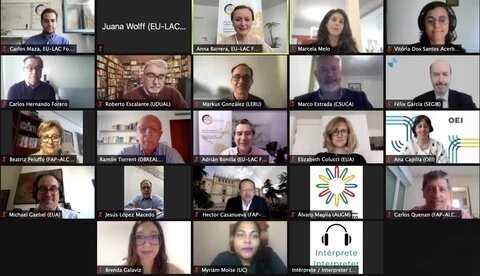On 18 June, the EU-LAC Foundation brought together leading representatives of higher education institutions to follow up on the “Matrix of Objectives and Strategic Lines for the Construction of the Common Area of Higher Education of the European Union and Latin America and the Caribbean”. The activity was attended by representatives of the Montevideo Group University Association (AUGM), the Higher Council of Central American Universities (CSUCA), the EU-CELAC University Council, the Latin American and Caribbean Higher Education Area (ENLACES), the European University Association (EUA), the Permanent Academic Forum Latin America and the Caribbean - European Union (FAP-ALCUE), the League of European Research Universities (LERU), OBREAL - Global Observatory (OBREAL Global), the Organisation of Ibero-American States (OEI), the Ibero-American General Secretariat (SEGIB), Universities Caribbean (UC), and the Union of Latin American Universities (UDUAL).
Dr Adrián Bonilla, Executive Director of the EU-LAC Foundation opened the meeting. He highlighted the Foundation's mandate to support the dialogue between the various academic actors in both regions to build the EU-LAC Common Higher Education Area, one of the goals agreed in the 2015 EU-CELAC Action Plan. To this end, the Foundation has been in charge of the creation and updating of the instrument "Matrix of Objectives and Strategic Lines for the Construction of the EU-LAC Common Area of Higher Education", which represents the only reference document on the actions needed to realise the EU-LAC Common Area of Higher Education. During this persistent process that started in 2017, the EU-LAC Foundation acts as a facilitator and coordinates between the relevant entities.
Dr Anna Barrera, Senior Programme Manager of the EU-LAC Foundation, then presented the updated document with the current initiatives carried out by the present institutions. The Foundation also invited the attendees to agree on priority areas of action contained in the Matrix that could be implemented in the short and medium-term and to identify those initiatives that could eventually be undertaken jointly, in order to create greater synergies and strengthen the work of each of the entities that have contributed to the construction of the EU-LAC Common Higher Education Area. Among the priority issues identified were the question of evaluation regimes for digital and virtual education, the challenge of moving the reflection of the normative levels down to society, and the goal of improving the visibility of the existing space.
The matrix serves as a point of convergence, to which the Foundation gives continuity by promoting the systematisation of themes and initiatives in order to strengthen the bi-regional space. A second meeting is planned for the end of 2021 in Hamburg.
